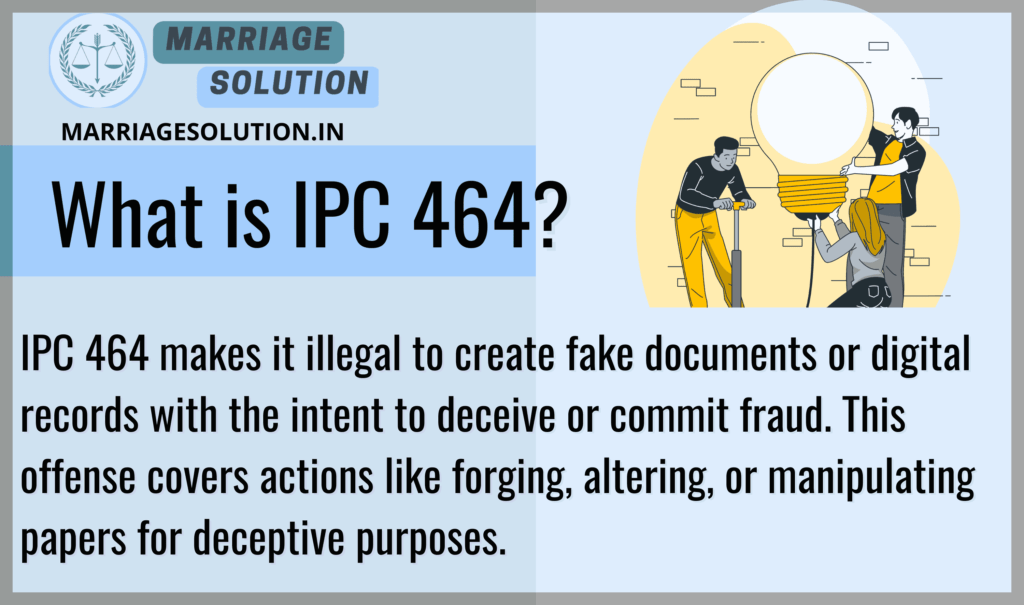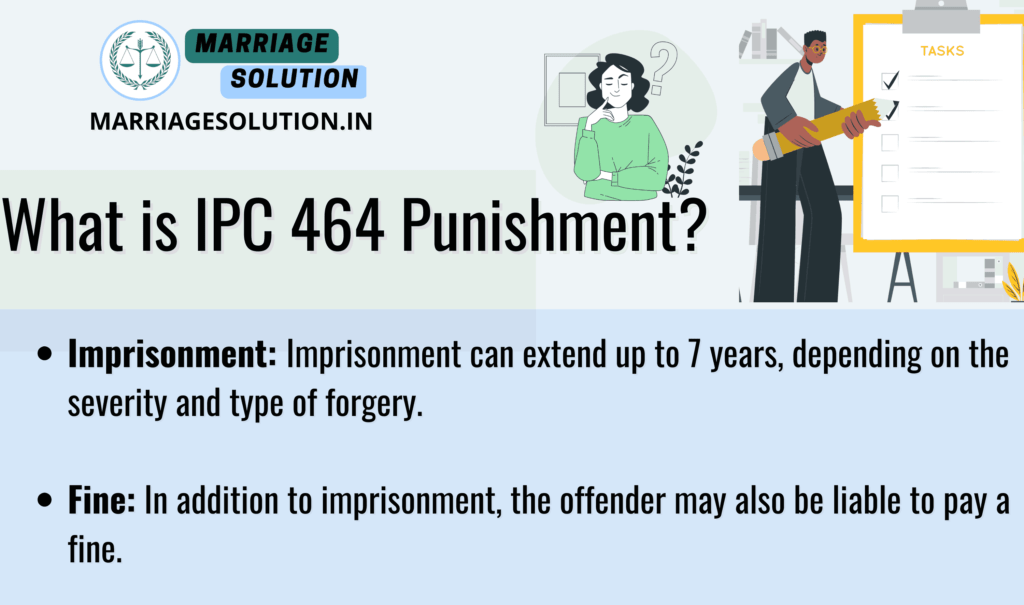Introduction of 464 IPC
IPC 464 prohibits the creation of fake documents or digital records with the intent to deceive or commit fraud. This includes making, altering, or tampering with documents for fraudulent purposes. Offenders can face imprisonment for up to seven years and fines. The non-bailable nature of the offense underscores its seriousness and the need for stringent enforcement.
What is Section 464 IPC ?
IPC 464 makes it illegal to create fake documents or digital records with the intent to deceive or commit fraud. This offense covers actions like forging, altering, or manipulating papers for deceptive purposes.

Section 464 IPC Explained
IPC 464 says it is illegal to make fake papers or computer records with the intent to trick someone or commit fraud. Making, changing, or messing with papers to trick other people is part of this. People who break IPC 464 can go to jail for up to seven years and have to pay a fine. The fact that you can’t easily get bail shows how seriously the law takes it.
- False Document Creation (Forgery):
- This point refers to the act of creating any document or electronic record that contains false information.
- It includes making new documents, altering existing ones, or tampering with records to deceive or mislead others.
- Intention to Cheat (Fraudulent Purpose):
- To commit the offense under IPC 464, the false document must be created with the intention of using it to cheat or commit fraud.
- If there is no intention to deceive or commit fraud, the act may not be considered an offense under IPC 464.
- Document or Electronic Record (Varied Forms):
- False documents can take various forms, including physical documents like papers or electronic records like digital files.
- This covers a wide range of documents, including legal papers, financial records, official documents, etc.
- Punishment Severity (Substantial Imprisonment):
- The punishment for IPC 464 is severe, with imprisonment for up to seven years.
- This punishment reflects the seriousness of the offense, recognizing its potential to cause harm or deception.
- Additional Fine (Financial Penalty):
- Besides imprisonment, the offender is also subject to paying a fine.
- The amount of the fine is determined by the court based on the severity and impact of the offense.
- Non-Bailable Offense (Serious Nature):
- IPC 464 is classified as a non-bailable offense, which means the accused person cannot be released on bail before their trial.
- This classification underscores the gravity of the offense and the necessity for strict legal measures to discourage such acts.
Section 464 IPC Punishment
- Imprisonment:
- Imprisonment can extend up to 7 years, depending on the severity and type of forgery.
- Fine:
- In addition to imprisonment, the offender may also be liable to pay a fine.

464 IPC bailable or not bailable ?
The offenses under IPC Section 464 are generally bailable. However, the person’s ability to get bail may rest on the details of the case and how section 465 or 467 of the Indian Penal Code is applied. When deciding on bail, courts usually look at the full facts and seriousness of the forgery.
Section 464 IPC in short information
| What is mean ? | Description |
|---|---|
| Definition | IPC Section 464 deals with the offense of creating or possessing false documents or electronic records with fraudulent intent. |
| Offence | Making, altering, or tampering with documents or electronic records to deceive or commit fraud. |
| Punishment | Imprisonment for up to seven years and a fine. |
| Bailable | Non-bailable offense, meaning the accused may not be released on bail before trial. |
464 IPC FAQs
What is the essence of the offense under IPC 464?
The essence of the offense under IPC 464 is making any false document or electronic record with the intention of using it for cheating or fraudulent purposes.
Does IPC 464 cover only physical documents or electronic records as well?
IPC 464 covers both physical documents as well as electronic records. It applies to any false document, regardless of its form.
Is the intention to cheat a necessary element for IPC 464?
Yes, the intention to cheat or use the false document for fraudulent purposes is a necessary element for the offense under IPC 464. Without this intention, the act may not constitute an offense.
Is the offense under IPC 464 bailable?
No, the offense under IPC 464 is a non-bailable offense.
What is the maximum punishment for an offense under IPC 464?
The maximum punishment for an offense under IPC 464 is imprisonment of either description (simple or rigorous) for a term which may extend to seven years, and the offender shall also be liable to pay a fine.
If you need support with court proceedings or any other legal matters, don’t hesitate to reach out for assistance.
Court or any other marriage-related issues, our https://marriagesolution.in/lawyer-help-1/ website may prove helpful. By completing our enquiry form and submitting it online, we can provide customized guidance to navigate through the process effectively. Don’t hesitate to contact us for personalized solutions; we are here to assist you whenever necessary!
